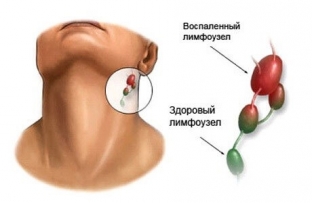Acute tonsillitis, or tonsillitis – an infectious disease that affects mainly the palatine tonsils. Various pathogenic microorganisms can provoke the development of angina, most often – staphylococcus and streptococcus. High fever, weakness, severe sore throat – the main signs by which we identify this disease. At the same time, many are quite calm about acute tonsillitis, preferring to limit themselves to gargling and antipyretics. This approach to treatment is quite dangerous, since the complications after a sore throat are often more serious than the disease itself.
What are the reasons for complications after a sore throat?
The main reason for the development of complications after acute tonsillitis is untimely or incorrect treatment of angina. There are several types of angina, but it is not at all difficult for a patient to suspect this disease in himself by the following symptoms:
- high temperature (rises rapidly, accompanied by chills);
- sore throat that becomes so intense over time that the person has difficulty swallowing;
- throat redness;
- general weakness, drowsiness;
- lack of appetite;
- pain in the joints.
However, the main problem with angina, as practice shows, is not related to diagnosis, but to the reluctance of many patients to see a doctor. Despite the fact that gargling in acute tonsillitis is a component of treatment, effective treatment of the disease requires taking medications prescribed by a doctor, depending on the causative agent of angina.
However, the main problem with angina, as practice shows, is not related to diagnosis, but to the reluctance of many patients to see a doctor.
If you do not receive proper or timely treatment, you risk complications after a sore throat:
- local;
- general.
What local complications can occur after a sore throat?
Local (or local) complications after angina affect the anatomical structures located near the tonsils. So, often patients after a sore throat complain of otitis media (inflammation of the middle ear), which is quite easy to recognize by the characteristic symptoms:
- pain in the ear;
- increase in body temperature;
- general malaise;
- hearing impairment.
Paratonsillitis, which is characterized by damage to the tissues adjacent to the tonsils, and the appearance of abscesses. Sore throat and fever – characteristic signs of this complication.
Swelling of the larynx can also be a consequence of angina due to a violation of the outflow of lymph. In this case, the patient has respiratory failure, & nbsp; and the danger of this complication lies in the risk of suffocation.

Retropharyngeal or peripharyngeal abscess – purulent inflammation of the tissues of the peripharyngeal zone or the posterior pharyngeal wall, which is accompanied by pain, shortness of breath, swollen lymph nodes. In this case, the patient needs surgery.
General complications after angina, affecting the organs and systems of the body
If the causative agents of acute tonsillitis are streptococci, the body reacts to such microorganisms by producing antibodies. The problem is that the complexes formed by antibodies and antigens of streptococci provoke an autoimmune inflammation caused by the similarity of the proteins of some tissues of the body with the antigens of bacteria. As a result of this, the so-called late complications of angina may occur:
- rheumatic heart disease, which most often threatens children aged 5-15 years and is dangerous for the further development of heart disease; symptoms: shortness of breath, swelling of the legs, pain in the region of the heart;
- glomerulonephritis is also most common among children (5-9) years of age; symptoms: swelling, increased blood pressure, changes in the urine;
- arthritis, which is accompanied by pain in the joints, their redness, swelling, stiffness of movements;
- sepsis, etc.
Taking into account the seriousness of possible complications after a sore throat, especially in children, estet-portal.com strongly recommends not self-medicating and contacting an ENT in a timely manner in case of symptoms of this disease.
Do not self-medicate and consult an ENT in a timely manner in case of symptoms of a sore throat.
Also recommended for angina:
- plentiful warm drink;
- bed rest for up to a week;
- frequent rinsing;
- drug treatment (prescribed by a doctor depending on the cause of the disease – antibiotics, antiviral drugs);
- strengthening the immune system;
- restriction of physical activity.
It is equally important to visit the doctor again after the treatment of angina to make sure that there are no dangerous complications. The specialist will prescribe the diagnostics necessary to determine the state of organs and systems at high risk of damage due to chronic tonsillitis.






Add a comment